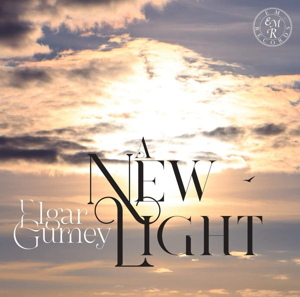
A New Light
Sir Edward Elgar (1857-1934)
Violin Sonata, Op.82 (1918-19)
Salut d’amour, Op.12 (1888)
Chanson de Nuit, Op.15 No.1 (pub 1897)
Chanson de Matin, Op.15 No.2 (pub 1899)
Ivor Gurney (1890-1937)
Violin Sonata in D major (1918-19)
Rupert Marshall-Luck (violin), Duncan Honeybourne (piano)
rec. 2021, Wyastone Concert Hall, Wyastone Leys, Monmouth, UK
EM Records EMRCD075 [73]
EM Records gives its discs distinctive, poetic titles. I wonder, though, whether ‘A New Light’ applies as much to violinist Rupert Marshall-Luck’s approach to the Elgar Sonata as it does to his world premiere recording of Gurney’s Sonata in D major. It would be easy to confuse this disc with EM CD011, released about a decade ago, which also contained the Elgar and Gurney sonatas – only that disc contained Gurney’s E Flat major sonata, similarly previously unrecorded, as well as a work by Lionel Sainsbury (review). The pianist was Matthew Rickard.
The Elgar Sonata is pretty much a repertory piece but, even so, to re-record it so soon demands some kind of explanation which is possibly where New Light enters. Firstly, Marshall-Luck has a new pianist, Duncan Honeybourne, and second, he has clearly subjected his earlier reading to a fairly radical overhaul in which both the second and third movements are significantly slower than their earlier counterparts. Marshall-Luck is throughout scrupulous with note values and he and Honeybourne dovetail their lines expertly. The ebb and flow of Elgar’s syntax is finely maintained, and the reflective intimacy of the slow movement leads to a withdrawal of tonal intensity that itself generates a variety of colour from the violinist, even at a slow tempo: only Kennedy and Pettinger, of the recordings I know, are slower.
For the finale, both players adhere strongly to the ‘non troppo’ indication of ‘Allegro, non troppo’ and this leads to a jog-trot rhythm in places that exposes Elgar’s sequential writing. The re-emergence of the Romance’s ‘Marie Joshua’ theme in the finale is more stoic than romantic-passionate. No one, in my experience, has ever taken the finale at such a dangerously slow tempo; it’s slower even than Tasmin Little and Martin Roscoe. Marshall-Luck’s tone is rather soft-grained, but this suits his intimate approach. I’m not going to pretend it’s a performance that convinces me (I prefer his earlier one) but there is room for a variety of approaches.
There are three sweetmeats before the Gurney. Salut d’amour again has precise note values, though they can sound clipped, and they make a less positive, finicky impression. The piano’s final bars aren’t the expected ones; I assume they’ve been incorporated from the version for orchestra but I’m no Elgarian scholar and as Marshall-Luck has edited some of these pieces for publication it would have been helpful to know. Chanson de Nuit and Chanson de Matin form a logical and rewarding pairing with more vibrato to be heard in the former.
Gurney’s Sonata was written at around the same time as Elgar’s. Its last piano bars no longer exist so Ian Venables has supplied them. This world premiere recording preserves a robust four-movement work of many likeable and admirable features. The opening movement is in sonata form, thematically and harmonically coherent, and the Scherzo that follows sounds as though it’s going to mine the folkloric but swiftly presents some charming writing instead with recapitulation; optimistic throughout. The slow movement enshrines easeful lyricism and sounds from a much earlier period than 1919. The piano writing is especially lovely, and the finale is confident, leading to a grand climax. It sounds freshly minted in this performance and should win Gurney some friends.
The fine recording is in Wyastone Concert Hall, and the notes complement the disc very well. There are no competitors for the Gurney, obviously, but there are plenty for the Elgar headed in my book by the superb virility of Albert Sammons with William Murdoch and recordings by Sammons’ musical offspring – Hugh Bean with David Parkhouse and, for interpretive though not sonic reasons, Alan Loveday with Leonard Cassini.
Jonathan Woolf
Help us financially by purchasing from




















